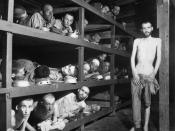A bleak, endless night: that is Elie Wiesel's outlook on life after he survived the torment of the Holocaust. Night, his autobiography, walks you step by agonizing step through his personal experience of the Holocaust. Throughout the story there are contrasting scenes of light and dark. Three of these scenes are: when the Jews felt joy when they received the signal to be departed, the image of the smoke rising into a silent blue sky, and the death of the beautiful, haunting pipel. Why, and how did the world let this happen? If we hadn't helped, then we would only be twisting the dagger within them. Although people are essentially good, this essence is quickly lost, and not quickly regained.
"Then, at last, at one o'clock in the afternoon, came the signal to leave. There was joy---yes, joy. Perhaps they thought that God could have devised no torment in hell worse than that of sitting there among the bundles, in the middle of the road, beneath the blazing sun; that anything would be preferable to that."
(Night page 14)
It's pitifully sad how wrong they were. Joy, light-hearted joy was emanating from these people who had been given the signal to leave. What they didn't know is that they were not leaving solely the ghetto, but each other, their love, their life, and their God. It seemed as if they were like cows being led to the slaughter, they don't know where they are going, or why, but they were content because they still had each other. Home is where the heart is, and their home was established within each other. They were together, so they were joyful. But the impending and dark reality was soon to ensue. They would be separated, sons would be torn...


